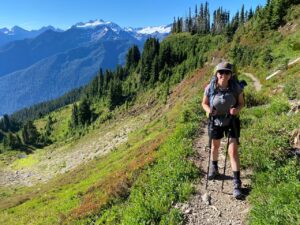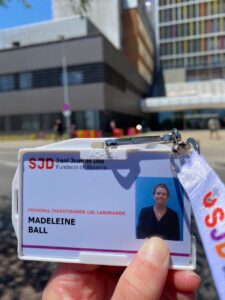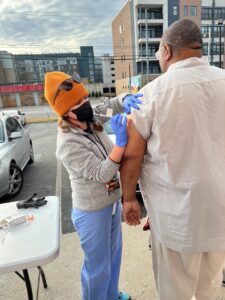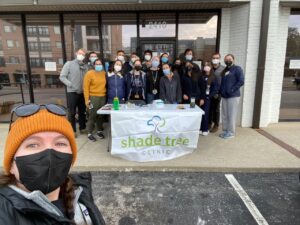Meet a Medical Scholar: Maddy Ball
M3 Maddy Ball traveled to Barcelona, Spain, for a year-long research project
By: Lexie Little
Maddy Ball is no stranger to travel.

A native of Mill Valley, California, just outside of San Francisco, she moved nearly 3,107 miles to Massachusetts, where she attended Tufts University. Flying over rigid mountain peaks, plains, rolling hills and valleys, she reflected on her appreciation for the environment and the American landscape, both important parts of her majors in environmental science and American studies.
Ball thought the courses she charted would lead to an industry job in environmental science or perhaps public health, where environmental health and inequities affect global health systems. But she took a different path.
“I had a somewhat circuitous route to medical school,” Ball said. “My junior or senior year, I realized medicine would likely be what I wanted to pursue, [but] I hadn’t taken any of the prerequisites yet. I wanted to be extra sure that if I were to make that career transition, there’s no doubt it’s what I want to do.”
Ball accepted a job in the technology industry to decide whether she wanted to stay in the private sector, all the while saving money for the possibility of medical studies. She missed human interaction and the service aspects she once embraced as she studied inequities in public health and the environment. With service and medicine in mind, she volunteered at a hospital while she researched a path toward medical school.
Ball completed prerequisite medical studies through a one-year post-baccalaureate program. Equipped with the knowledge necessary to apply, she again set sights on locations across the country. Back in California, she worked at Shriners Children’s Hospital for one year as a clinical research coordinator. There, she discovered a passion for congenital abnormalities research, the study of medical conditions present from birth. That passion led her to Nashville, Tennessee – to Vanderbilt University School of Medicine (VUSM).
“Everybody has a different path, and each one is valid,” Ball said. “That’s part of what makes medicine a dynamic field. I’m grateful to have had that time because it makes me even more motivated and certain that this is what I want to do with my life. Through all my experience, I think research is one of the biggest, most steadfast parts of my life.”
As a first-year medical student, Ball befriended a fourth-year student who had just completed the Medical Scholars Program, a competitive funded research year that supports any type of biomedical research anywhere in the world. Medical Scholars receive a $30,000 stipend, benefits, and $1,500 conference allowance to present their research.
Associate Dean for Medical Student Affairs Amy Fleming, MD, MHPE, had helped to connect program alumna Stephanie Hadley to a mentor in Barcelona, Spain. As soon as Ball learned about the opportunity, she knew she should apply, even if she would have to take an extra year to complete her MD studies.
“What’s the rush?” Ball said. “I don’t really view this as year out of my MD studies, so to speak, I think of it as a continuation of the path that I’ve been on for a long time. I really think one of the coolest things about Medical Scholars is it’s not a specific project you have to do and apply specifically for. This project opens the door for us to explore diverse and important topics that are of interest to us. We propose a project that we’re passionate about.”

With Dean Fleming’s help, Ball connected with a research mentor at Sant Joan de Déu pediatric hospital in Barcelona. She recently started work on her project, studying neuromonitoring in children with congenital heart defects. She and her lab colleagues will study a device – a cap – worn by babies with congenital defects to view information like how much oxygen is in the brain or electrical signaling. She hopes the project will lead to an effective tool to give physicians and researchers a better understanding of how their brains develop.
“While surgery has come a long way for kids with congenital heart defects, they’re at an increased risk for long-term cognitive abnormalities,” Ball said. “At Shriners, my work involved clinical trials in kids with [other congenital defects], and if anything, that has prepared me the most for this project in Spain, working with a neonatal population.”
Yet, her travels once again opened Ball to a new world, this time the world of basic science animal research.
“I’ll be working with pigs for some of the testing, which I have never done, so I will certainly be relying on my friends in the Medical Scientist Training Program [MD/PhD pathway] at Vanderbilt to guide me through some conversations around this kind of experimental design” she said. “I enjoy working with my hands, so I think I’ll really like working in the lab. It’s a different kind of work than clinical research, but it’s applied in a way that will be both fun for me and hopefully important for patients.”
Though she has never conducted this kind of research before, others like her mentor Dr. Melissa Kaufman have every confidence in Ball’s abilities. Ball connected with Kaufman, chief of the Division of Reconstructive Urology and Pelvic Health at Vanderbilt University Medical Center, because her tactile nature piqued her interest in surgery and urology.
“Endeavoring to expand her horizons and knowledge with the Medical Scholars experience at Vanderbilt School of Medicine was a natural fit for the exceptionally adaptable and capable Maddy Ball,” Kaufman said. “Maddy’s maturity, dedication and insight were evident from the first time we met during her initial engagement with Urology. Maddy has consistently displayed outstanding clinical acumen and surgical judgment, and we are delighted to support her decision to embark on an international research collaboration for her next level of training. The Medical Scholars experience will most assuredly manifest with impactful projects that transform both Maddy and all her future patients.”
Patients remain a critical motivating factor in Ball’s research. Having worked with patients who have spina bifida, cerebral palsy, and related conditions, she hopes to give care informed by the latest research advancements to improve her future patients’ quality of life. She looks to mentors like Kaufman as examples for great physicians and researchers, particularly in urology.
Ball envisions a balance between clinical, operating room, and research time in the future, much like her mentor.
“I could see myself working 50 to 80% in the clinical space and 20 to 50% on research in my career as a physician. Fortunately, with an MD, you can still participate in a significant amount of research efforts without writing a dissertation and earning a PhD. But nothing’s off the table. It’s hard to know where your path will lead until you get there,” Ball said.
For now, Ball stays focused on completing her Medical Scholars research before finishing her MD curriculum at Vanderbilt. She attributes her success so far to the community and collaboration fostered at VUSM.
Senior students guided her toward dedicated research, Medical Student Affairs facilitated her year away, and faculty like Kaufman supported her scholarly efforts.
“From a research perspective in our field, it can sometimes be hard to find mentors who will take you and support you on projects. But the opportunities are endless here. If there’s something of interest to you, there’s someone here to support you to get it done,” Ball said.
Though she misses VUSM activities and missions like working at the student-run Shade Tree Clinic, she gladly accepts a new challenge through research, Spanish language acquisition, and service to a new patient population.
Ball has worked on community outreach for Shade Tree, a free clinic that serves the underserved populations of Nashville. Students not only help to provide necessary care under the supervision of faculty attending physicians, but they also help patients navigate a complex health care system. The patient panel, which comprises a large Spanish-speaking population, has grown by nearly 50 patients in recent months. That growth gives Ball motivation to learn how to better serve them through her Medical Scholars experience.
“I’m very excited to immerse myself in another culture and see how the health care system works in a different place,” she said. “I’m also very excited to work with my mentors; the principal investigators on this project seem fantastic. They’re so committed to their work and their patient population. Growing those connections and learning from people with a different skill set than me is very exciting.”
While Ball hopes for a formative experience in Spain, she already looks forward to traveling back to Nashville to support her classmates on Match Day 2023, the day when graduating students learn where they will complete their medical residency training. She will watch her cohort open their envelopes, but she will feel no less joy, content to be a traveler on her own career journey.

